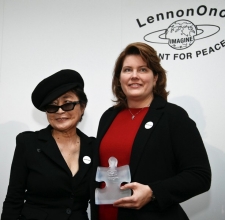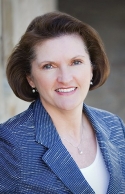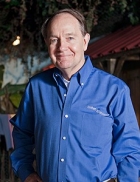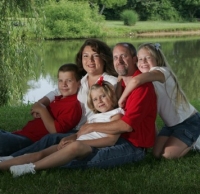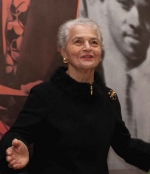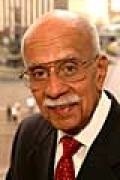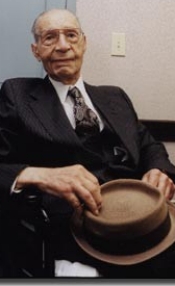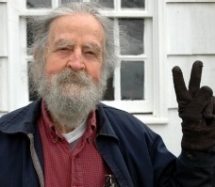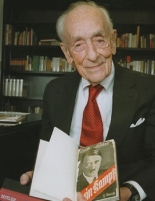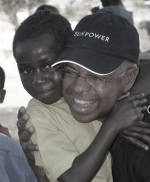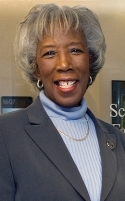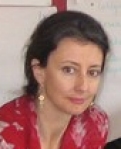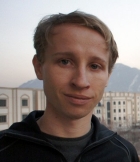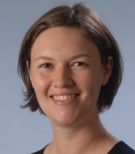Human-rights champions from among famous UC alumni
Making food safer for everyone
Barb Kowalcyk, D (Med) '12, watched her healthy 2-year-old son go from a giggling toddler to a malnourished child vomitting black bile while lying in the hospital with tubes sticking out of everywhere. Within two weeks of him eating E. coli-tainted hamburger he was dead. That was 2001. The more she and her husband searched for answers the more infuriated they became, so the decided to do something more than grieve.
First Kowalcyk formed a victim advocacy organization. In 2006, she founded the Center for Foodborne Illness Research & Prevention, a science-based advocacy organization dedicated to translating the latest research into evidence-informed policies. At the same time, she enrolled at UC to earn a doctorate in environmental health with a focus in epidemiology and biostatistics. In 2009, she appeared in the 2009 Oscar-nominated documentary "Food, Inc." In 2010, she co-authored a report by the National Academy of Sciences that became the blueprint for the Food Safety Modernization Act, which the FDA calls "the most sweeping reform of our food safety laws in more than 70 years." That’s also the year she won the LennonOno Grant for Peace, an award Yoko Ono offers to honor her late husband's commitment to peace, truth and human rights. In 2011, she became an assistant research professor in the Department of Food, Bioprocessing and Nutrition Sciences at North Carolina State University.
LINK: Read UC Magazine's full article on her.
CFO largest U.S. hunger-relief organization
Janet Gibbs, Bus '79, is chief financial officer of Feeding America, the largest hunger-relief organization in the nation, distributing more than 2.5 billion pounds of food annually. “The beauty of what I'm doing is that I get excited by what I do everyday,” she says. Before coming to Feeding America in 2009, Gibbs worked as associate executive director and CFO of the American Bar Association; CFO and vice president for finance as Loyola University; vice president, business and fiscal affairs at Wright State University; and university controller at Ohio State University. In addition, she has worked as an independent financial consultant and held senior management and supervisory positions with accounting firms Arthur Young & Co. and Ernst &Whinney.
LINK: Read UC Magazine’s entire story on her.
Tackling economic disparity
Matthew 25 Ministries founder
Wendell Mettey, A&S '68, is founder and president of the nationally recognized Matthew 25 Mnistries. The faith-based not-for-profit, located in Blue Ash, seeks products from corporations otherwise headed to the dump due to small defects, then repackages the products and sends them all across the world for aid and relief. In 2011, Forbes gave the ministry a No. 1 spot on the magazine's list of "20 Most Efficient Large Charities in the U.S." Former pastor Mettey named the organization from the ending of the biblical passage that also defines their work. Matthew 25: 34-40 concludes with: "Truly I tell you, whatever you did for one of the least of these brothers and sisters of mine, you did for me."
LINK: Read his full UC Magazine story.
Helping Appalachia's struggling poor
Bryan Byrd, CAS '89, gave up a lifestyle of suburban ease to help Appalachia's struggling poor. In 2006, he left behind a 17-year career as manager of design for Cincinnati's Al Neyer, a house and a comfortable life in the suburbs, taking his wife and their three children with him to start a modestly paid job as housing manager for the nonprofit Christian Appalachian Project in eastern Kentucky. "We take a lot of substandard shacks, trailers and houses, improving them if we can," explains with alumnus with degrees in construction management and civil engineering. If needed, they obtain grants to build new housing. In 2012, he remained in his new career.
LINK: Read his entire story in UC Magazine.
Ending discrimination, domestic violence in Cincinnati
Marian Spencer, A&S ’42, HonDoc ’06, is as well know a civil-rights activist in Cincinnati as was her husband of 67 years, Donald. Her civil rights activities began early — joining the NCAAP at age 13 and campaigning for an open college prom when she was a UC student. Her renown came in desegregating Coney Island after she and her family were turned away on July 4, 1952, by a front-gate guard brandishing a gun. She and others later faced the legal consequences of trying to gain entrance to the park daily, and she chaired the NAACP Legal Action committee in filing a suit against the park, which they won. She was instrumental in integrating the Cincinnati YWCA in the 1950s and halting discrimination against local black voters in 2004. She became the first African-American woman elected to Cincinnati City Council (’83), first and only woman president of the Cincinnati NAACP chapter (’80) and the first African-American elected president of the local Woman’s City Club (’72).
Breaking down local racial barriers for 70 years
Donald Spencer (1915-2010), A&S '36, Ed '37, MEd '40, HonDoc '06 — along with his wife, Marian, A&S '42, HonDoc '06 — helped break down racial barriers in Cincinnati for nearly 70 years. Donald was the first African-American broker to join the Cincinnati Association of Real Estate Brokers in 1986 and was later elected president of the organization. He founded his real estate firm, Donald Spencer and Associates, while a teacher for Cincinnati Public Schools. He was a lifetime member of the NAACP and the first African American to chair Ohio University's Board of Trustees. He also was active in the Cincinnati USA Regional Chamber and was named a "Great Living Cincinnatian" in 2005. His wife Marian had her own long civil rights career, including being the first African American elected to Cincinnati City Council.
National civil rights leader, Cincy's first black mayor
Theodore “Ted” Berry (1905-2000), A&S '28, Law '31, was a national civil rights leader who became Cincinnati’s first black mayor in 1972. Born in rural Kentucky, Berry graduated from Woodward High School as Cincinnati's first black valedictorian, then earned UC degrees while working at a steel mill. After graduation, he was hired as Hamilton County's first black assistant prosecuting attorney, then went on to become a civil-rights attorney for the National Association for the Advancement of Colored People. Later President Franklin D. Roosevelt named him morale officer for the Office of War Information, and President Lyndon Johnson appointed him head of Community Action Programs. Back in Cincinnati, he served on the Ohio Committee for Civil Rights Legislation and created Cincinnati's first Community Action Commission. After his death, Cincinnati City Council named three projects in his honor: Theodore Berry Head Start Children and Family Learning Center, the Theodore Berry International Park on Eastern Avenue and Theodore Berry Way, a street near the riverfront.
LINK: Read his story in UC Magazine.
African American heritage at UC
Georgia Beasley, Ed '25, and other African-American alumni talk about what campus was like in their days. Read UC Magazine story.
Civil-rights attorney serves low-income residents
Mike Tafelski, JD '07, started his human-rights experience at the UC's Domestic Violence and Civil Protection Order Clinic, a joint effort with the Legal Aid Society of Greater Cincinnati. Through the clinic, third-year law students actually represent Hamilton County domestic violence and sexual assault victims in attaining a civil-protection order. Shortly after graduation, he became a civil-rights attorney, serving low-income residents at Georgia Legal Services in Macon, Ga., which he was still doing in 2012.
LINK: Read more.
Gave peace a chance
Gordon Maham (1917-2013), Eng '41, was a longtime anti-nuclear activist. He was a civil engineer whom the Army Corps of Engineers hired to help construct the ultra-secret National Security Complex plant for enriching uranium as part of the Manhattan Project's Y12 Plant in Oak Ridge, Tenn. When he learned that he was helping to build the first atomic bomb, he resigned, which cost him his war-industry draft exemption, which led to his being drafted. When he failed to report for military induction, he was sentenced to three years in federal prison. His social justice efforts continued behind bars as he tried to desegregate the prison.
He came back to Oak Ridge often to protest the facility he had unwittingly helped build and was arrested for demonstrating there at least nine times. He also protested on behalf of the homeless and against the School of the Americas. He spent his life spreading peace and helping others and said he lost track of how many times he had been arrested in peaceful protests. (See his obituary.)
Nazi survivors keeps memories alive
Promoting tolerance and truth for nearly 70 years
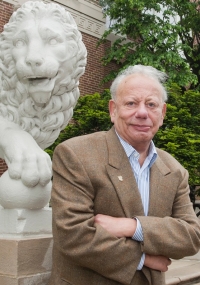
Sigmund Rolat visited his alma mater in 2012 and posed with Mick and Mack in front of McMicken Hall.
Sigmund Rolat, ’52, was only a child in Częstochowa, Poiand, when Nazis killed his entire family and he survived the Holocaust. The teenager found his way to the U.S. and to UC. After graduating, he moved to New York City where he made his wealth in the shipping and finance business. Today he is a philanthropist restoring important landmarks in Poland, reuniting ancestors of Częstochowa Jews who are scattered around the world and helping people understand that, for 1,000 years, Jews and Christians had a productive and peaceful coexistence in Poland.
He also organized and sponsored the exhibit “The Jews of Częstochowa: Coexistence-Holocaust-Memory,” which began touring internationally in 2004 and came to Cincinnati in 2012. In 2012, he was president of the World Society of Częstochowa Jews and Their Descendants; had funded the restoration of Częstochowa’s historically significant Jewish cemetery; had chaired the nine-day Krakow Jewish Culture Festival, the world's largest such festival; and was busy creating the Museum of the History of Polish Jews, due to open on the site of the former Warsaw Ghetto in October 2013. “The Museum will be a place for the promotion of openness, tolerance and truth,” he said.
LINK: Read his UC Magazine story; view extensive photo gallery.
Former German soldier prosecutes Nazi war criminals
Werner Von Rosenstiel (1911-2008), att. UC 1935-36, was trained as a soldier in Adolf Hitler's army, then later helped prosecute Nazi wars criminals in court. He first escaped Germany and reached the United States, where he became a exchange student at UC. Against German orders, he stayed in the states to pursue his legal education. When World War II began, however, he became an enemy alien of the U.S. After proving his loyalty to America, the young attorney was eventually drafted by the U.S. Army and (after a stint in the Foreign Legion) was sent back to Europe to help prosecute Nazi war criminals. Von Rosenstiel, who retired from both an American and a German law firm, returned to UC in 2001 to donate his vast collection of historical materials, all of which are housed in the Von Rosenstiel Reading Room on the third floor of McMicken Hall.
LINK: Read UC Magazine feature article on Von Rosenstiel.
Determined to stop slavery, human trafficking
Trying to end child slavery in Haiti
Jean Robert-Cadet, M (A&S) '94, spent the first 15 years of his life as unpaid domestic worker in Haiti, which means he was often abused and treated as a slave, known as a restavek. In 1969, he managed to find his way to the U.S. and escaped the system. In 1998, he published his first book, "Restavec: From Haitian Slave Child to Middle-Class American," which gained international attention. To make the plight of Haiti's children known worldwide, he has spoken before the United Nations, the International Labor Organization and the U.S. Congress, as well as appeared on "The Oprah Winfrey Show," CNN and "60 Minutes." In 2010, he founded the Jean R. Cadet Restavek Organization, which leads him to travels to Haiti every six weeks to continue work.
LINK: Read his full story and view an extensive photo gallery in UC Magazine.
Country's leading scholar in human-trafficking law
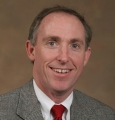
Terry Coonan
Terry Coonan, JD '95, has been the executive director of the Center for the Advancement of Human Rights at Florida State University since its founding in 2000 and is a leading scholar in the field of human-trafficking law in the U.S. After working in Chile and Central America with torture victims and the families of the disappeared, he served for several years advising U.S. judges on immigration and refugee law. He went on to litigate asylum and torture victim protection cases throughout the country. He has also worked with the UN SubCommission for Human Rights in Geneva and the U.N. High Commission for Refugees in Washington, D.C. (updated 5-13)
Fighting for human rights
Whole life dedicated to social justice
Jeannette Taylor, PhD (A&S) '79, has been a crusader for social justice and a mentor to countless minorities and women for more than 50 years. In 1960, she was an African-American Delaware State University undergraduate who had joined demonstrators across the country by sitting at a local drugstore counter where blacks were not welcome. While a graduate student at Atlanta University's School of Social Work, she and her peers worked to integrate the staff at area social-service agencies. As a result, she and a classmate became the first African-American students placed as interns at Georgia's Milledgeville State Hospital. She also marched with Martin Luther King Jr. from Selma to Montgomery, despite threats from her dean that she wouldn't graduate. Her involvement, however, did lead to her being thrown in jail — with men, not women, because she wanted to “act like a man,” she was told.
After earning her UC PhD, she became UC's director of continuing education, then UC’s first female African-American dean in 1989 when she led the former College of Evening and Continuing Education. Being a UC professor of social work now brings her UC service to years in 2012. A conference room in UC's French Hall West was named in her honor. "I've spent my whole life working toward social-justice issues," she says. "It has become a part of me. It is just what I'm supposed to do when things are not right."
LINK: Read UC Magazine’s entire story on her.
Human rights advocate in Burundi
Tracy Dexter, JD '90, is a human rights advocate in the African country of Burundi, considered one of the five poorest countries on earth by the United Naions. In 2007, she was the country manager for International Alert, an independent peace-building organization that worked closely with the UN and the European Union to help some of the world's most fragile states avoid violent conflict. Her responsibilities include helping shape UN policies to sustain peace between the Hutu and the Tutsi, the two main ethnic groups that locked into a deadly power struggle from 1993 to 2006.
LINK: Read entire UC Magazine story on her.
Rethinking refugee camps
Mitchell Sutika Sipus, M (DAAP '10 & '11), is using two degrees from the College of Design, Architecture, Art, and Planning to help end poverty, eradicate violence and educate leaders on a global level. When his 2004 experiences among Tibetan refugees during a three-month hitchhiking journey in the Himalayas moved him to help combat poverty, he came to UC to get two degrees — one in community planning (wth an international-development track focused on economics, urban design and social-science research methods) and one in architecture (research focused on anthropology, philosophy and historic preservation). While a student, he advocated for youth as a United Nations delegate, worked in a Kenya/Somalia refugee camp, then worked with engineers in the Dadaab refugee camps to construct safe spaces for children. In Cairo, he continued his research on the urban planning of refugee camps. In 2012, he was on the faculty at the American University of Afghanistan, a new university dedicated to training future leaders.
LINK: Read his entire story in UC Magazine.
Worked closely with Nelson Mandela
Pamela Bridgewater, M (A&S) '70, HonDoc '06, is a U.S. career diplomat, most recently posted as the U.S. Ambassador to Ghana, from 2005-08, and the longest-serving U.S. diplomat in South Africa, who worked closely with Nelson Mandela as apartheid came to an end.
LINK: Read more.
Civil-rights careeer began as a student
Carrie Hagan-Gray, JD '05, entry into a career involving civil rights began during her first summer of law school when she worked as a human-rights team intern at the New Zealand Human Rights Commission in Auckland. Through her second year at UC, she worked as a law clerk with the Legal Aid Society of Greater Cincinnati. Following graduation and passing the bar, she returned to Legal Aid as a staff family-law attorney amd one the agency’s first supervising attorneys at UC's Domestic Violence and Civil Protection Order Clinic, where students represent people who otherwise would not have a lawyer with them through civil-protection-order hearings. In 2009-10 at the Roger Williams University School of Law, she created a new, family-law related clinic focused on domestic violence.
Setting examples
Black Film Festival selection
Creative-writing alumnus Matt Dunnerstick, A&S '01, received eight film-festival awards for writing and directing his first independent feature film, "The Custom Mary." In early 2013, the new film writer and director made a particularly impressive showing at the San Diego Black Film Festival, one of the country's largest black film festivals, with a win for Best Cutting Edge Film and Best Religious Film.
LINK: Read more.
First black marathoner
First black Homecoming Queen
Vera Derkson Williams, Nur ’78, was UC’s first black homecoming queen.
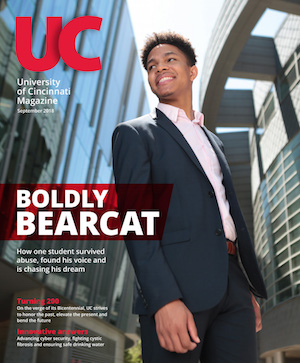
 Past Issues
Past Issues